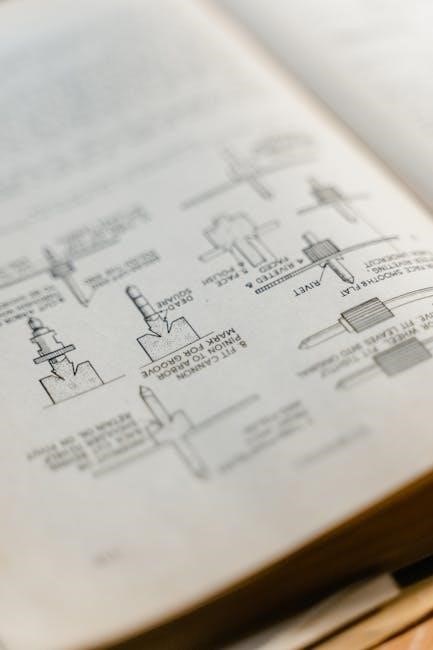The Fundamentals of Engineering Reference Manual is a comprehensive guide essential for FE exam preparation‚ covering mathematics‚ physics‚ chemistry‚ and engineering principles with sample problems.
Overview of the FE Exam
The Fundamentals of Engineering (FE) exam is the first step toward becoming a licensed Professional Engineer (PE) in the United States. Administered by the National Council of Examiners for Engineering and Surveying (NCEES)‚ the exam assesses foundational knowledge in mathematics‚ physics‚ chemistry‚ and core engineering principles. It is designed to test the ability to apply basic engineering concepts to solve problems. The exam consists of 110 multiple-choice questions and is typically completed within 6 hours. Passing the FE exam demonstrates competence in engineering fundamentals‚ making it a critical milestone for engineering graduates and professionals seeking licensure. Preparation often involves studying the Fundamentals of Engineering Reference Manual‚ which provides essential formulas‚ charts‚ and reference material.
Importance of the FE Exam in Engineering Careers
The FE exam plays a pivotal role in shaping engineering careers‚ serving as a gateway to professional licensure. Passing the exam demonstrates a strong grasp of engineering fundamentals‚ enhancing credibility and competitiveness in the job market. It is a prerequisite for becoming a licensed Professional Engineer (PE)‚ a credential that opens doors to leadership roles‚ higher salaries‚ and greater career opportunities. Employers often view the FE exam as a benchmark of competency‚ making it a critical step for aspiring engineers. By achieving this milestone‚ engineers not only meet state licensing requirements but also position themselves for long-term success and advancement in their field; The FE exam is thus a foundational achievement with lasting career implications.
Structure and Content of the FE Exam
The FE exam is designed to test foundational engineering knowledge and consists of 110 multiple-choice questions. It is divided into sections covering mathematics‚ physics‚ chemistry‚ engineering mechanics‚ and electrical engineering. The exam evaluates problem-solving skills and understanding of core concepts. Questions are designed to assess the ability to apply engineering principles to real-world scenarios. The exam is computer-based and lasts approximately six hours‚ including a tutorial and scheduled breaks. Candidates must manage their time effectively to complete all questions within the allotted timeframe. The content is based on the Fundamentals of Engineering Reference Manual‚ ensuring alignment with exam topics. Proper preparation requires a thorough understanding of the exam format and content.

Preparation Strategies for the FE Exam
Creating a comprehensive study plan‚ utilizing practice exams‚ and focusing on fundamental concepts are crucial for effective FE exam preparation. Consistency and understanding are key to success.
Study Materials and Resources
The NCEES Fundamentals of Engineering Reference Manual is the primary resource for FE exam preparation‚ offering detailed explanations and practice problems. Supplementary materials like textbooks‚ online guides‚ and video lectures provide additional support. Many candidates benefit from study groups and forums where they can discuss challenging topics. Practice exams‚ such as those offered by PPI or Scribd‚ simulate test conditions and help identify weak areas. Utilizing a combination of these resources ensures a well-rounded understanding of engineering fundamentals. Regularly solving practice problems and reviewing key concepts strengthens problem-solving skills. A structured study plan‚ combined with consistent effort‚ maximizes the effectiveness of these materials. Leveraging diverse resources enhances comprehension and confidence for the exam.
Practice Exams and Their Role in Preparation
Practice exams play a crucial role in FE exam preparation by simulating real test conditions‚ helping candidates assess their readiness and identify knowledge gaps. They provide valuable insights into the exam format‚ question types‚ and time management. Regularly taking practice exams builds confidence and reduces anxiety. Many resources‚ such as those from PPI or NCEES‚ offer realistic practice exams that mirror the actual test experience. Reviewing mistakes and understanding solutions improve problem-solving skills. Consistent practice not only reinforces engineering fundamentals but also enhances critical thinking and judgment. By familiarizing oneself with the exam structure‚ candidates can optimize their performance and approach the actual test with greater assurance. Utilizing practice exams effectively is essential for achieving success on the FE exam.
Time Management and Study Schedules
Effective time management is critical for FE exam success. Creating a structured study schedule helps candidates allocate sufficient time to each subject‚ ensuring comprehensive preparation. Start by identifying weak areas and prioritize them. Break study sessions into manageable chunks‚ balancing technical topics with regular breaks to maintain focus. Consistency is key; dedicate a specific number of hours daily to studying. Use calendars or planners to track progress and set realistic milestones. Avoid cramming by spreading out study material evenly over weeks or months. Regularly review and adjust the schedule to accommodate changes in workload or understanding. A well-organized study plan not only enhances retention but also reduces exam-related stress‚ ensuring a more confident approach to the FE exam.

Key Subjects Covered in the FE Exam
The FE exam covers mathematics‚ physics‚ chemistry‚ and engineering mechanics‚ focusing on foundational concepts and practical applications essential for professional engineering competence and problem-solving skills.
Mathematics and Engineering Fundamentals
Mathematics forms the cornerstone of engineering‚ with topics like calculus‚ differential equations‚ and linear algebra being crucial. These concepts are applied to solve real-world problems‚ ensuring precise designs and analyses. Engineering fundamentals‚ including statics‚ dynamics‚ and thermodynamics‚ build on this mathematical foundation; Understanding these principles is vital for developing safe and efficient systems. The FE exam tests proficiency in these areas‚ requiring applicants to demonstrate their ability to apply theoretical knowledge to practical scenarios. Strong math skills and a grasp of engineering basics are essential for success‚ as they underpin all engineering disciplines. Proper preparation in these fundamentals ensures a solid foundation for tackling more complex challenges in the exam and beyond.
Physics and Its Applications in Engineering
Physics is integral to engineering‚ providing the principles that govern energy‚ motion‚ and forces. Key areas include mechanics‚ thermodynamics‚ and electromagnetism. Engineers apply these concepts to design systems‚ analyze stresses‚ and optimize performance. The FE exam assesses understanding of physics-based problems‚ requiring the ability to translate theoretical knowledge into practical solutions. Mastery of physics ensures engineers can develop safe‚ efficient‚ and innovative technologies. Study materials emphasize problem-solving techniques and real-world applications‚ helping candidates grasp how physical laws influence engineering decisions. By leveraging physics‚ engineers create solutions that meet technical and safety standards‚ underscoring its vital role in the field.
Chemistry and Material Science Basics
Chemistry and material science form the foundation for understanding the properties and behaviors of substances used in engineering. The FE exam covers fundamental concepts such as atomic structure‚ chemical bonding‚ and thermodynamics. Material science focuses on the classification‚ properties‚ and applications of metals‚ polymers‚ ceramics‚ and composites. Engineers must grasp how materials respond to environmental factors like temperature‚ stress‚ and corrosion. These principles are crucial for designing safe and durable structures and systems. Study materials emphasize problem-solving techniques‚ such as determining material strength and chemical reactions. Mastery of these basics enables engineers to select appropriate materials for specific applications‚ ensuring reliability and performance in real-world engineering scenarios. Understanding these concepts is essential for tackling more complex engineering challenges.
Engineering Mechanics and Statics
Engineering mechanics and statics are fundamental to understanding the behavior of physical systems under various loads. Statics focuses on objects in equilibrium‚ analyzing forces‚ moments‚ and torques. Key concepts include free-body diagrams‚ friction‚ and structural analysis. Engineers use these principles to design stable systems‚ ensuring safety and functionality. The FE exam tests problem-solving skills in applying statics to real-world scenarios‚ such as determining support reactions or analyzing beam bending. Mastery of these concepts is crucial for progressing in engineering‚ as they form the basis for more advanced topics like dynamics and mechanical systems. Effective study materials and practice problems are essential for building proficiency in this area‚ enabling engineers to tackle complex challenges with confidence.

Engineering Principles and Problem Solving
Engineering principles and problem-solving involve applying fundamental concepts to real-world challenges‚ emphasizing critical thinking‚ design variables‚ and systematic approaches to develop innovative solutions.
Understanding Engineering Judgment and Critical Thinking
Engineering judgment and critical thinking are vital skills for solving complex problems. They involve assessing scenarios‚ identifying key principles‚ and applying mathematical and scientific knowledge effectively. Critical thinking enables engineers to evaluate options‚ prioritize solutions‚ and make informed decisions. Engineering judgment ensures that ethical and practical considerations are integrated into problem-solving. These skills are essential for interpreting data‚ designing systems‚ and optimizing processes. They also help engineers adapt to unforeseen challenges and communicate solutions clearly. Developing strong engineering judgment and critical thinking requires practice‚ experience‚ and a deep understanding of fundamental principles. These skills are central to the FE exam and real-world engineering applications‚ enabling professionals to innovate and lead effectively in their fields.
Design Variables and Their Importance
Design variables are parameters that engineers manipulate to achieve desired outcomes in a system or product. They are fundamental to the engineering design process‚ enabling optimization and innovation. Understanding design variables is crucial as they directly impact performance‚ cost‚ and functionality. Engineers must identify and analyze these variables to make informed decisions. For example‚ in mechanical systems‚ variables like material type‚ dimensions‚ and force application are critical. In electrical engineering‚ variables such as voltage‚ current‚ and resistance play key roles. Proper management of design variables ensures safety‚ efficiency‚ and reliability. They are central to problem-solving and are extensively tested in the FE exam‚ reflecting their importance in real-world engineering applications and professional practice.
Mathematical Modeling in Engineering Scenarios
Mathematical modeling is a critical tool in engineering‚ enabling the representation of complex systems through equations and algorithms. It simplifies real-world problems into manageable mathematical forms‚ allowing engineers to analyze‚ predict‚ and optimize behavior. Models are developed based on physical laws and empirical data‚ ensuring accuracy and reliability. Engineers use these models to simulate scenarios‚ identify potential issues‚ and test solutions before implementation. Mathematical modeling is essential in fields like structural analysis‚ thermodynamics‚ and electrical systems. It fosters innovation by providing a framework for design and experimentation. Proficiency in mathematical modeling is a key skill assessed in the FE exam‚ reflecting its importance in modern engineering practice and problem-solving.

Application of Engineering Fundamentals
Engineering fundamentals are applied in real-world scenarios through statics‚ dynamics‚ thermodynamics‚ and material science‚ solving practical problems and optimizing systems for efficient and safe design solutions.
Statics and Dynamics in Real-World Engineering
Statics and dynamics are fundamental engineering disciplines applied extensively in real-world scenarios. Statics involves the analysis of forces and moments in equilibrium‚ ensuring the stability and safety of structures like bridges and buildings. Dynamics‚ on the other hand‚ deals with systems in motion‚ such as engines‚ turbines‚ and moving vehicles. Both principles are crucial for designing efficient and reliable mechanical systems. Engineers use these concepts to solve practical problems‚ from calculating load capacities to optimizing energy consumption. The Fundamentals of Engineering Reference Manual provides detailed explanations and examples to help engineers master these principles‚ enabling them to apply statics and dynamics effectively in diverse engineering challenges.
Thermodynamics and Heat Transfer Applications
Thermodynamics and heat transfer are vital engineering fields with broad applications in power generation‚ refrigeration‚ and heating systems. Thermodynamics focuses on energy conversion and its interactions with work and heat‚ while heat transfer examines the movement of thermal energy through conduction‚ convection‚ and radiation. These principles are essential for designing efficient engines‚ HVAC systems‚ and thermal management solutions. The Fundamentals of Engineering Reference Manual provides in-depth coverage of these topics‚ offering key equations‚ problem-solving techniques‚ and practical examples. Engineers rely on this knowledge to optimize system performance‚ enhance energy efficiency‚ and ensure safety in various industrial and everyday applications‚ making thermodynamics and heat transfer indispensable tools in modern engineering.
Material Science and Its Practical Implications
Material science explores the properties‚ composition‚ and applications of various materials‚ such as metals‚ polymers‚ ceramics‚ and composites. Understanding material behavior is crucial for engineering design‚ as it directly impacts strength‚ durability‚ and performance in different environments. The Fundamentals of Engineering Reference Manual delves into key concepts like stress-strain relationships‚ material failure modes‚ and selection criteria. Practical implications include developing lightweight components for aerospace‚ corrosion-resistant materials for infrastructure‚ and biocompatible materials for medical devices. Engineers use this knowledge to innovate and ensure safety and efficiency in diverse applications‚ making material science a cornerstone of modern engineering advancements and problem-solving.

The Role of Licensing in Engineering
Licensing in engineering establishes professional standards‚ ensuring public safety and competency. It validates expertise‚ builds trust‚ and offers career advancement opportunities for engineers.
Professional Engineer (PE) License Overview
The Professional Engineer (PE) license is a prestigious credential that validates an engineer’s expertise and commitment to the profession. It is typically required for engineers who oversee projects or offer services to the public. To become a PE‚ one must first pass the Fundamentals of Engineering (FE) exam‚ gain relevant work experience‚ and then pass the Principles and Practice of Engineering (PE) exam. The licensing process varies by state but generally involves meeting educational‚ experiential‚ and ethical standards. Holding a PE license enhances career opportunities‚ demonstrates professional competence‚ and builds trust with clients and employers. It is a key milestone for engineers aiming to advance their careers and take on leadership roles in their field.
Benefits of Becoming a Licensed Engineer
Becoming a licensed Professional Engineer (PE) offers numerous benefits‚ including increased earning potential‚ access to leadership roles‚ and enhanced job security. A PE license demonstrates expertise and adherence to ethical standards‚ fostering trust with clients and employers. It also provides legal authority to sign off on projects and offer engineering services to the public. Licensed engineers often qualify for higher-level positions and greater responsibilities‚ making them more competitive in the job market. Additionally‚ having a PE license can open opportunities for entrepreneurship‚ as it is often required to start an engineering firm. Overall‚ licensure is a significant career advancement step‚ showcasing commitment to professional excellence and expanding opportunities for growth in the engineering field.
Licensing Process and Requirements
To become a licensed Professional Engineer (PE)‚ candidates must meet specific requirements‚ typically including earning an accredited engineering degree and gaining relevant work experience. The licensing process begins with passing the Fundamentals of Engineering (FE) exam‚ followed by several years of professional practice under the supervision of a licensed PE. Once the experience requirement is fulfilled‚ candidates must pass the Principles and Practice of Engineering (PE) exam. Additionally‚ most states require applicants to complete continuing education courses to maintain licensure. The licensing process ensures that engineers possess the necessary knowledge‚ skills‚ and ethical standards to practice safely and effectively‚ protecting both the public and the profession’s integrity.
Resources and Support for Engineering Students
Engineering students can access textbooks‚ online forums‚ and academic advising for guidance. Mentorship programs and study groups provide additional support to help students succeed in their studies.
Recommended Textbooks and Study Guides
The NCEES FE Reference Manual is the primary resource for exam preparation‚ offering detailed explanations and practice problems. Supplement with textbooks like Engineering Fundamentals and FE Exam Review. Online platforms such as PPI2Pass provide comprehensive study guides and video lectures tailored to specific engineering disciplines. Additionally‚ solutions manuals and practice exams from reputable publishers like Chegg and Scribd can enhance understanding. Many engineering students also benefit from study groups and forums like Reddit’s r/EngineeringStudents‚ where peers share resources and strategies. Utilizing a combination of these materials ensures a well-rounded preparation for the FE exam‚ covering all necessary topics from mathematics to engineering principles.
Online Forums and Communities for Engineering Students
Online forums and communities provide invaluable support for engineering students preparing for the FE exam. Platforms like Reddit’s r/EngineeringStudents and r/Feng offer spaces to ask questions‚ share resources‚ and connect with peers. Engineering-specific forums such as Eng-Tips and Engineering.com host discussions on exam strategies and problem-solving techniques. Facebook groups like FE Exam Prep and Engineering Success also serve as hubs for advice and encouragement. These communities often feature experienced engineers and licensure holders who provide insights and tips. Additionally‚ online forums can help students stay motivated and informed about the latest exam updates. By leveraging these platforms‚ students can access a wealth of knowledge and support to aid their FE exam preparation journey.
Academic Advising and Mentorship Programs
Academic advising and mentorship programs play a crucial role in guiding engineering students through their studies and FE exam preparation. Advisors help students create tailored study plans‚ ensuring they cover all necessary topics from the Fundamentals of Engineering Reference Manual. Mentorship programs connect students with experienced engineers who provide insights into exam strategies and real-world applications of engineering principles. Many universities offer peer mentoring‚ where senior students share their study techniques and tips for mastering challenging subjects. Additionally‚ academic advisors often recommend supplementary resources‚ such as practice exams and study guides‚ to help students prepare effectively. These programs not only enhance academic performance but also foster confidence and readiness for the FE exam and future engineering careers.
The Fundamentals of Engineering Reference Manual is an indispensable resource for exam preparation‚ combining essential concepts and practical applications to guide aspiring engineers toward professional licensure and lifelong learning.
Summarizing Key Points of the FE Exam
The FE exam is a critical step toward becoming a licensed Professional Engineer (PE)‚ assessing fundamental engineering knowledge and problem-solving skills. It covers mathematics‚ physics‚ chemistry‚ and engineering mechanics‚ with a focus on practical applications. The exam evaluates the ability to analyze and solve problems under timed conditions‚ emphasizing engineering judgment and critical thinking. Preparation requires a deep understanding of core concepts and effective time management. Practice exams and study materials‚ such as the Fundamentals of Engineering Reference Manual‚ are essential tools for success. Passing the FE exam demonstrates competence and commitment‚ opening pathways to advanced engineering roles and professional growth.
Encouragement for Aspiring Engineers
Aspiring engineers‚ remember that persistence and dedication are key to success. The journey may be challenging‚ but each step‚ including the FE exam‚ brings you closer to your goals. Embrace continuous learning and seek resources like the Fundamentals of Engineering Reference Manual to strengthen your foundation. Building a strong grasp of engineering principles early on will pave the way for a rewarding career. Surround yourself with supportive peers and mentors who can offer guidance and encouragement. With hard work and resilience‚ you can overcome obstacles and achieve your aspirations in the engineering field‚ making a meaningful impact through innovative solutions and problem-solving skills.
Continuous Learning in the Field of Engineering
Continuous learning is vital in engineering‚ as the field evolves rapidly with new technologies and methodologies. Engineers must stay updated on industry trends‚ best practices‚ and emerging tools to remain competitive. The Fundamentals of Engineering Reference Manual serves as a foundational resource‚ but engineers should also explore advanced textbooks‚ online courses‚ and professional development opportunities. Engaging in online forums and communities can provide valuable insights and support. By fostering a mindset of lifelong learning‚ engineers can adapt to challenges‚ innovate effectively‚ and contribute meaningfully to their profession. Investing time in professional growth ensures expertise stays relevant and enhances problem-solving capabilities in dynamic engineering environments.